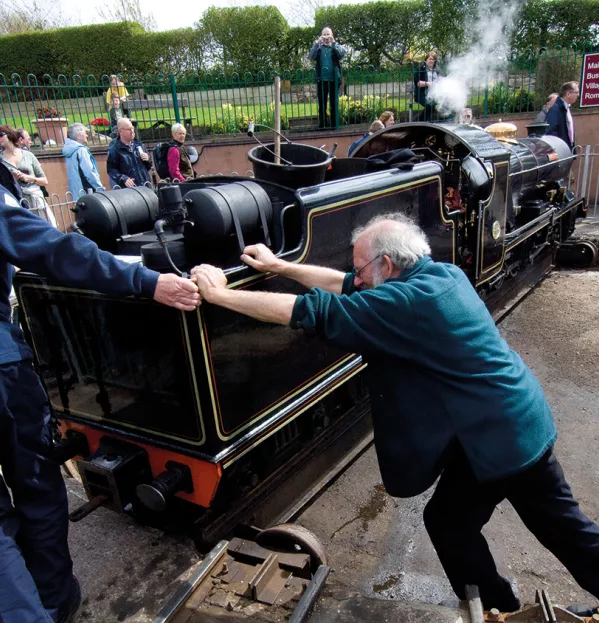
Let’s build a head of steam on skills standards reform

We urgently need to improve skills and productivity across the whole economy. This is increasingly pressing with Brexit only 18 months away.
An overly burdensome, complex and expensive structure of skills regulation and bureaucratic processes is slowing progress, however. Yet there appears to be little urgency within the government to address this.
If we are to succeed and continue to enjoy a comfortable standard of living, we must create excellent quality goods and services, efficiently produced by a skilled workforce that is able to compete against workforces in Asia, China and India.
Where do we start? UK workforce skills are generally at a lower level than that of our competitors, and national productivity is 15.1 per cent below other major economies, according to the Office for National Statistics. Of course, we have some excellent people - just not enough of them.
Brexit is not the trigger for these problems; the UK’s issues with developing the skills of our workforce are not new. However, it does bring them into focus.
Over the past two decades, a series of well-intentioned policy reforms has failed during implementation, resulting in frustration and cynicism.
This looked set to change in 2013, when the government embarked on sensible reforms of apprenticeships and technical education (T-levels), which are ongoing.
However, to make them work well and achieve the quality result that we are all looking for, we now need some real drive and urgency behind their implementation.
England has been working on the employer-led “Trailblazer” apprenticeship reform for four years yet we still do not have a full set of reformed apprenticeship standards across the economy.
Such delays should be ringing alarm bells for apprenticeships and skills minister Anne Milton. Bureaucratic processes are slowing down progress, as are the delays in setting up the Institute for Apprenticeships, the body with responsibility for approving apprenticeships standards. As things stand, we have only tens of thousands of people on the new apprenticeships - less than half of the figure starting apprenticeships last year.
The recently published T-level plan equally lacks ambition. Despite the fact that we all know that we will need T-levels for levels 1 to 7, the government’s plan is currently for level 3 only (equivalent to A-levels) for 16- to 19-year-olds, and even this will not be implemented until 2024.
Even if the government manages to stick to this already delayed timescale, by 2024 we would have only 0.7 per cent of the workforce with “improved levels of skilling”. This is just not fast enough to address the urgent needs in the economy.
Efficient regulatory structure
We also need a regulatory and quality assurance structure that is efficient and fit for purpose. In many other countries, there is a single qualification or a single apprenticeship for a specific job role.
However, in the UK, a fragmented policy landscape with burdensome and varied regulation results in several different qualifications or apprenticeships for the same specific job - hardly a basis for efficiently developing the competitive and productive skills we need.
This fragmented structure is confusing and complex, which just adds to the overall costs. Its complexity makes it more difficult to convince employers and employees to improve skill levels. The impact of this is low productivity, long hours, and poor pay and conditions.
There are four separate governments - in Northern Ireland, Scotland and Wales, as well as the one in Westminster - going in different directions on skills development.
There are many players that regulate or contribute to the regulation of skills in the UK, including Ofsted, Ofqual, the Quality Assurance Agency for Higher Education, the Higher Education Funding Council for England, the Institute for Apprenticeships and the Education and Skills Funding Agency - and that’s just in England.
The funding for these organisations is not transparent, therefore the total expenditure on skills regulation across the UK is unclear. Presumably, such complexity comes at a substantial cost.
Do we really need this many organisations to produce a single manufacturing technician or a nurse or a financial adviser? The simple answer is no. It is no wonder that UK-wide employers are holding their heads in their hands in despair.
The government needs to urgently streamline and speed up the regulatory landscape and bureaucratic processes, directing its funding towards giving people the skills to increase their productivity and future life chances.
Graham Hasting-Evans is group managing director of awarding body NOCN
You need a Tes subscription to read this article
Subscribe now to read this article and get other subscriber-only content:
- Unlimited access to all Tes magazine content
- Exclusive subscriber-only stories
- Award-winning email newsletters
- Unlimited access to all Tes magazine content
- Exclusive subscriber-only stories
- Award-winning email newsletters
You need a subscription to read this article
Subscribe now to read this article and get other subscriber-only content, including:
- Unlimited access to all Tes magazine content
- Exclusive subscriber-only stories
- Award-winning email newsletters
- Unlimited access to all Tes magazine content
- Exclusive subscriber-only stories
- Award-winning email newsletters